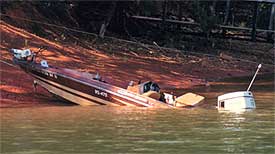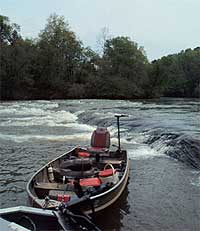Prepare Boat Batteries For Cold Weather
Prepare Boat Batteries For Cold Weather
By Bill Vanderford
 The changeable weather of the past few weeks has pointed to the fact that winter is on the way. This seasonal change triggers some of the best fishing of the year, but if one plans to enjoy it from the comfort of a boat, the cranking and deep cycle batteries must be prepared for the cold.
The changeable weather of the past few weeks has pointed to the fact that winter is on the way. This seasonal change triggers some of the best fishing of the year, but if one plans to enjoy it from the comfort of a boat, the cranking and deep cycle batteries must be prepared for the cold.
Put on some old clothes that can be thrown away if they come into contact with battery acid, don a pair of protective glasses, mix a solution of baking soda and water (50-50) and keep it nearby so that it can be used to neutralize any acid spills, and apply the following suggestions:
- 1. Disconnect the marine batteries and remove them from the boat.
- 2. Inspect the cables and connectors. Repair or replace them if necessary.
- 3. Clean and brush the cable connectors with a wire brush, removing the crusty, corrosion build-up. Coat the connectors with white grease to help maintain good contact between the connectors and batteries.
- 4. Wire brush the battery posts to remove the white, crusty material. Coat the terminals with white grease or Vaseline to help ward off the effects of corrosion.
- 5. With a disposable rag, wipe the crud, dirt and grit from the battery cases. Dispose of this rag.
- 6. Dip another rag into a neutralizing solution of baking soda and water, wring out the excess fluid, and wipe down the battery cases.
- 7. Check the battery acid levels. Add distilled water or de-ionized water, as required, to bring electrolyte levels to within 1/8th of an inch of the bottom of the vent well, or 1/4th of an inch from the bottom if the battery is discharged. Don’t overfill, or sulfuric acid may escape out of the vents. Don’t use tap water or well water. They often contain chlorine, iron, or salts that will harm the battery.
- 8. Recharge the batteries. Do not overcharge. Excessive overcharging causes loss of electrolyte, and the interior plates shed their active material, reducing capacity. Always charge in a well-ventilated area.
- 9. Cold weather charging requirements make a strong recommendation for the use of a "smart" battery charger. These chargers are equipped with a microprocessor capable of recharging each battery according to its own particular needs.
- 10. If the boat is not used until spring, store batteries in a cool, dry, and well-ventilated place, far away from the furnace. Make sure they’re out of reach from kids and pets. A temperature of about 50 degrees is ideal. A garage is fine for storage as long as the temperature inside doesn’t dip below freezing. A frozen battery is a dead battery. Never try to charge a frozen battery.
- 11. When batteries are stored, they slowly lose their charge. Therefore, they should be checked monthly. Restore water levels then bring the batteries up to a full charge if needed. A charged battery lasts longer than a battery in a discharged state.
 For those who have maintenance-free gel cell batteries the winterizing routine is the same except with a sealed case. Electrolyte can’t be added. It’s especially important, therefore, that gel cell batteries are not overcharged, or charged too quickly. If that happens, the gel in the battery can heat up and will have a tendency to dry out, shrink and pull away from the lead plates.
For those who have maintenance-free gel cell batteries the winterizing routine is the same except with a sealed case. Electrolyte can’t be added. It’s especially important, therefore, that gel cell batteries are not overcharged, or charged too quickly. If that happens, the gel in the battery can heat up and will have a tendency to dry out, shrink and pull away from the lead plates.
Whether you plan to use your boat or store it until spring, these simple suggestions will save you lots of frustrations and money too. As the old saying goes, "An ounce of prevention is worth a pound of cure."
Bill Vanderford has won numerous awards for his writing and photography, and has been inducted into the Freshwater Fishing Hall of Fame as a Legendary Guide. He can be reached at 770-962-1241, at [email protected], or at his web site: www.fishinglanier.com.
|
